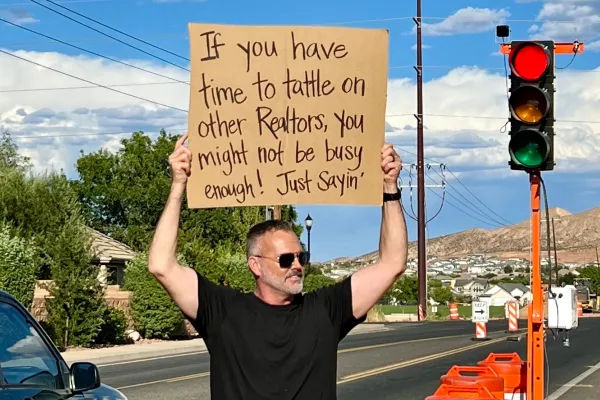
Utah Real Estate News
Resource Links
Thousands of Potential Home Buyers Are Coming to St. George
Are You Ready To Sell?
Thousands are coming, and if you're ready to sell your home, contact a realtor who will sell it for top dollar!

Why Are Utah Home Sellers Losing Thousands of Dollars...Even With a Realtor?
Selling your home can be one of the most significant financial decisions you'll ever make. But many Utahns are losing thousands of dollars without even realizing it.
With countless factors to consider—from pricing strategy to home preparation—it's easy to make costly mistakes that reduce your home's value or delay the sale. Worse, many sellers unknowingly trust real estate agents to handle everything without doing their homework.
So how can you avoid leaving thousands of dollars on the table when selling your home? Here’s a deep dive into the common pitfalls and, more importantly, what you should do instead to maximize your profits.
Mistake #1: Ignoring Market Research and Overpricing Your Home
Setting the right price is crucial. Overpricing is one of the biggest mistakes sellers and real estate agents make. Many homeowners believe their property is worth more than the market value, often due to emotional attachment or misinformation.
Real estate agents might even agree to a higher asking price to secure your listing. But the reality is that an overpriced home can sit on the market for months, and when it finally sells, it often does so below market value.
The Data:
According to the National Association of Realtors (NAR), homes that are priced correctly from the start sell 50% faster and for closer to the asking price than those that are overpriced. The longer your home stays on the market, the more likely you are to have to lower the price, and buyers may assume something is wrong with the property.
Real-Life Example:
Take the case of Sarah and David, who listed their home in Southern Utah at $750,000—$30,000 above market value. They received very few showings over the first month, and as the listing became "stale," they had to reduce the price twice. In the end, their home sold for $710,000, far below what it could have fetched had they priced it correctly from the beginning.
Do This Instead:
Get a Comparative Market Analysis (CMA): Ask your agent to provide you with a CMA that looks at recent sales of similar properties in your area.
Monitor Local Trends: Research the price per square foot in your neighborhood and monitor seasonal
trends.
Be Realistic: Price your home slightly below market value to attract multiple offers, which can drive the price up.
Mistake #2: Skimping on Home Preparations
You might think your home is perfect just the way it is, but today’s buyers are savvy and expect homes to be move-in ready. Failing to properly prepare your home can cost you thousands in reduced offers or force you into costly negotiations during the closing process.
The Data:
A study by HomeLight found that 75% of agents recommend staging, and homes that are staged sell for an average of 6-10% more than those that aren’t. Simple improvements like a fresh coat of paint or decluttering can increase your home's perceived value.
Real-Life Example:
John, a homeowner in St. George, Utah, listed his house without any updates or repairs. His home had visible wear and tear, outdated fixtures, and cluttered spaces. Despite his agent’s advice to declutter and repaint, he listed the home "as-is." After several months on the market, John ended up selling for $30,000 less than he anticipated because buyers factored in the cost of repairs and the perceived value of the home was underestimated.
Do This Instead:
Deep Clean and Declutter: Remove personal items and unnecessary furniture to make your home feel larger and more appealing.
Stage Key Rooms: Focus on staging the living room, master bedroom, and kitchen to create a welcoming atmosphere.
Invest in Minor Repairs: Fix leaky faucets, patch up holes, and repaint with neutral colors to give your home a fresh look.
Focus on Curb Appeal: A well-maintained lawn, clean driveway, and fresh landscaping can make a huge difference in first impressions.
Mistake #3: Hiring the Wrong Realtor
Not all real estate agents are created equal. Some will simply list your home and wait for offers to roll in, while others will actively market your property, negotiate skillfully, and provide valuable guidance. Hiring the wrong agent can cost you in terms of both time and money.
The Data:
According to Zillow, homes sold with a top-performing real estate agent sell for an average of $10,000 to $20,000 more than homes sold by less-experienced agents. Top agents are more likely to use professional photography, effective marketing strategies, and superior negotiation skills.
Real-Life Example:
Susan hired a part-time agent who lacked experience in her local market. The agent listed her home with poor-quality photos, did minimal marketing, and wasn't familiar with local trends. After 90 days on the market with little activity, Susan decided to switch to an experienced agent who re-listed the home with professional photos, held open houses, and used targeted online advertising. The home sold within two weeks for $15,000 more than the original list price.
Do This Instead:
Research Agents Thoroughly: Look for agents with a proven track record in your area and check their reviews and references.
Ask About Their Marketing Strategy: Make sure they use professional photography, social media advertising, and virtual tours.
Evaluate Communication: Choose an agent who is responsive, transparent, and provides regular updates on your listing.
Mistake #4: Neglecting to Market Your Home Effectively
In today’s digital age, it’s not enough to simply put a "For Sale" sign in your yard and wait for buyers. Poor marketing can result in fewer showings, lower offers, and a longer time on the market.
The Data:
Homes with professional photography sell 32% faster than those with amateur photos, according to Redfin. Furthermore, homes marketed online with virtual tours and 3D walkthroughs see a significant boost in buyer interest.
Real-Life Example:
A homeowner in Ivins, Utah, tried to sell his home using photos he took with his smartphone. The photos were poorly lit, blurry, and didn't show off the property’s best features. After three months with little interest, his agent hired a professional photographer and created a virtual tour. Within a week of re-listing, the home received multiple offers, ultimately selling for $12,000 over asking price.
Do This Instead:
Invest in Professional Photography: High-quality images make a huge difference in attracting online buyers.
Utilize Virtual Tours: Especially for out-of-town buyers, a virtual tour can provide an immersive experience that increases interest.
Leverage Social Media: Share your listing on platforms like Facebook, Instagram, and LinkedIn to reach a wider audience.
Host Open Houses and Private Showings: Engage potential buyers with well-advertised open houses and offer virtual open houses if needed.
Mistake #5: Being Emotionally Attached to Your Home
Selling your home can be an emotional experience, but letting those emotions get in the way can hurt your bottom line. Whether it’s holding out for a higher price or refusing to make needed repairs, emotional attachment can lead to poor decisions.
The Data:
According to Realtor.com, homes that are overpriced due to emotional attachment take up to three times longer to sell. Sellers who are more flexible and open to negotiations often sell faster and for closer to asking price.
Real-Life Example:
Anna inherited her childhood home, and despite it needing major repairs, she refused to lower the price or invest in improvements. The home sat on the market for over six months. After she finally agreed to make repairs and lower the price, the home sold quickly for a fair market price.
Do This Instead:
Keep Emotions in Check: View your home as a business transaction rather than a sentimental asset.
Be Willing to Negotiate: Understand that compromise on price or repairs may be necessary to close the deal.
Focus on the Bigger Picture: Your goal is to sell at the best price possible—don’t let emotional decisions derail that.
Summary and Where Do You Go From Here
Selling your home is a complex process, but with the right strategies, you can avoid losing thousands of dollars. By pricing your home correctly, preparing it for the market, hiring the right agent, and leveraging effective marketing tactics, you’ll maximize its value and attract motivated buyers.
If you're thinking about selling your home in Southern Utah and want expert guidance, contact a local realtor today. They'll help you navigate the selling process and ensure you walk away with the best possible outcome.
Don’t lose money on your home sale—take control of the process and maximize your profit!
Contact your local realtor, and they will best be able to help you navigate the ever-changing real estate market.
For further data, you can access local real estate statistics at the Utah Association of Realtors

The Code of Ethics VS Just Being Petti
The sign I’m holding is a humorous jab, but there’s a lot more to unpack here.
As realtors, we wear many hats—advisor, negotiator, marketer, and sometimes even therapist. Our industry is built on trust, integrity, and a commitment to ethical behavior. Yet, there’s a fine line between upholding these high standards and getting caught up in the pettiness that can sometimes overshadow our real purpose.
It’s crucial to adhere to the code of ethics governing our profession, but it’s equally important to recognize when we’re crossing from constructive criticism into unnecessary nitpicking.
Let’s be honest—our job is challenging enough without adding extra drama. We juggle client expectations, navigate ever-changing market conditions, and keep up with a constant stream of new rules and regulations. With so much on our plates, it’s easy to get sidetracked by what others are doing wrong instead of focusing on our own work. But this kind of negativity doesn’t benefit anyone—it distracts us from what really matters: serving our clients and improving our industry.
The Importance of Professionalism
Don’t get me wrong—there are times when reporting unethical behavior is not just appropriate but necessary. When the integrity of our profession is at stake, it’s our duty to take action. However, not every mistake or oversight warrants a formal complaint. Sometimes, a simple phone call can do the trick. Imagine the impact of reaching out to a fellow realtor and saying, "Hey, I noticed a small error in your listing—just thought I’d let you know." It’s a quick, courteous gesture that can solve the problem without escalating the situation or damaging professional relationships.
This approach fosters a collaborative environment where we help each other grow rather than compete on trivial matters. After all, we’re all in the same boat, facing the same challenges. By supporting each other, we create a stronger, more united industry that benefits everyone—ourselves, our colleagues, and most importantly, our clients.
The Reality of Over-Regulation
Now, let’s talk about regulations. We all know that rules are necessary to ensure fairness and protect consumers, but sometimes it feels like the pendulum swings too far. Some regulations are so detailed and restrictive that they seem to create more problems than they solve. It’s not uncommon to find ourselves frustrated by rules that seem arbitrary or overly bureaucratic.
It’s okay to be frustrated. It’s okay to question the rationale behind certain regulations. In fact, it’s important that we do so. As professionals who are on the front lines, we have a unique perspective on what works and what doesn’t. By voicing our concerns and advocating for practical, effective policies, we can help shape the future of our industry in a way that makes sense for everyone involved.
Action Items: How to Become a Better Realtor
With all this in mind, how can we strive to be better realtors? Here are a few actionable steps that can help us elevate our practice and contribute positively to the real estate community:
1. Focus on Continuous Learning
The real estate industry is always evolving, and so should we. Whether it’s attending workshops, earning certifications, or simply staying up-to-date with the latest market trends, continuous learning is key to staying relevant and providing the best service to our clients.
Consider setting aside time each week for professional development. It could be reading industry blogs, taking online courses, or even joining a mastermind group with fellow realtors.
2. Practice Ethical Communication
Before reporting an issue, ask yourself if it’s something that could be resolved with a simple conversation. Sometimes, picking up the phone or sending a friendly email can address the concern without escalating it to the board.
When communicating with clients, colleagues, or competitors, always aim to be transparent, honest, and constructive. Ethical communication builds trust and strengthens your reputation as a professional.
3. Advocate for Sensible Regulations
If you find certain regulations to be counterproductive, don’t just complain—get involved. Join your local real estate board or association, participate in discussions, and advocate for changes that make sense.
Share your experiences and suggestions with policymakers. Real-world insights from professionals like us can help shape more practical and effective regulations.
4. Support Your Peers
Building a strong network of supportive colleagues can make all the difference in your career. Instead of seeing other realtors as competition, view them as allies. Share knowledge, offer help when needed, and celebrate each other’s successes.
Attend industry events, engage in online forums, and contribute positively to the realtor community. The more we support each other, the stronger we all become.
5. Keep Your Clients First
At the end of the day, our primary responsibility is to our clients. Always put their needs first and work tirelessly to achieve the best outcomes for them.
Make it a habit to regularly check in with your clients, even after a transaction is complete. This not only strengthens your relationship but also keeps you top-of-mind for future referrals.
6. Embrace a Positive Mindset
Real estate can be a rollercoaster, with highs and lows that test our resilience. Maintaining a positive mindset can help you navigate the challenges and keep your focus on what really matters.
Practice gratitude, celebrate your wins, and learn from your setbacks. A positive attitude not only improves your own well-being but also makes you a more attractive partner to clients and colleagues alike.
Conclusion: Elevating Our Industry Together
As realtors, we have the power to shape the future of our industry. By focusing on what truly matters—ethical behavior, continuous learning, and supporting each other—we can rise above the pettiness that sometimes plagues our profession. Yes, we’ll continue to follow the rules, even when they’re frustrating, but we’ll also advocate for better ones. And above all, we’ll keep our clients’ best interests at the forefront of everything we do.
So next time you find yourself with a little too much time on your hands, instead of nitpicking at others, consider how you can contribute positively to our industry. Let’s be the change we want to see, lifting each other up and working together to create a real estate community that we can all be proud of.
Because if you have time to tattle, maybe it’s time to refocus on what really counts.
















